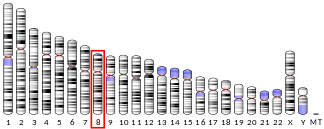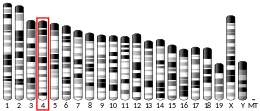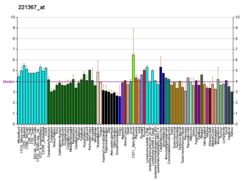MOS (gene)
Proto-oncogene serine/threonine-protein kinase mos is an enzyme that in humans is encoded by the MOS gene.[5][6]
Interactions
References
- 1 2 3 GRCh38: Ensembl release 89: ENSG00000172680 - Ensembl, May 2017
- 1 2 3 GRCm38: Ensembl release 89: ENSMUSG00000078365 - Ensembl, May 2017
- ↑ "Human PubMed Reference:".
- ↑ "Mouse PubMed Reference:".
- ↑ Singh B, Arlinghaus RB (May 1998). "Mos and the cell cycle". Prog Cell Cycle Res. 3: 251–9. doi:10.1007/978-1-4615-5371-7_20. PMID 9552420.
- ↑ "Entrez Gene: MOS v-mos Moloney murine sarcoma viral oncogene homolog".
- ↑ Lenormand, J L; Benayoun B; Guillier M; Vandromme M; Leibovitch M P; Leibovitch S A (Feb 1997). "Mos activates myogenic differentiation by promoting heterodimerization of MyoD and E12 proteins". Mol. Cell. Biol. UNITED STATES. 17 (2): 584–93. doi:10.1128/mcb.17.2.584. ISSN 0270-7306. PMC 231783. PMID 9001211.
Further reading
- Sagata N (1997). "What does Mos do in oocytes and somatic cells?". BioEssays. 19 (1): 13–21. doi:10.1002/bies.950190105. PMID 9008413.
- Caubet JF, Mathieu-Mahul D, Bernheim A, et al. (1986). "Human proto-oncogene c-mos maps to 8q11". EMBO J. 4 (9): 2245–8. PMC 554492. PMID 3000766.
- Watson R, Oskarsson M, Vande Woude GF (1982). "Human DNA sequence homologous to the transforming gene (mos) of Moloney murine sarcoma virus". Proc. Natl. Acad. Sci. U.S.A. 79 (13): 4078–82. Bibcode:1982PNAS...79.4078W. doi:10.1073/pnas.79.13.4078. PMC 346580. PMID 6287464.
- Heikinheimo O, Lanzendorf SE, Baka SG, Gibbons WE (1995). "Cell cycle genes c-mos and cyclin-B1 are expressed in a specific pattern in human oocytes and preimplantation embryos". Hum. Reprod. 10 (3): 699–707. PMID 7540181.
- Lenormand JL, Benayoun B, Guillier M, et al. (1997). "Mos activates myogenic differentiation by promoting heterodimerization of MyoD and E12 proteins". Mol. Cell. Biol. 17 (2): 584–93. doi:10.1128/mcb.17.2.584. PMC 231783. PMID 9001211.
- Liu H, Vuyyuru VB, Pham CD, et al. (1999). "Evidence of an interaction between Mos and Hsp70: a role of the Mos residue serine 3 in mediating Hsp70 association". Oncogene. 18 (23): 3461–70. doi:10.1038/sj.onc.1202699. PMID 10376524.
- Pham CD, Vuyyuru VB, Yang Y, et al. (1999). "Evidence for an important role of serine 16 and its phosphorylation in the stabilization of c-Mos". Oncogene. 18 (30): 4287–94. doi:10.1038/sj.onc.1202804. PMID 10439036.
- Proikas-Cezanne T, Stabel S, Riethmacher D (2002). "Identification of protein tyrosine phosphatase 1B and casein as substrates for 124-v-Mos". BMC Biochem. 3: 6. doi:10.1186/1471-2091-3-6. PMC 102758. PMID 12022922.
- Strausberg RL, Feingold EA, Grouse LH, et al. (2003). "Generation and initial analysis of more than 15,000 full-length human and mouse cDNA sequences". Proc. Natl. Acad. Sci. U.S.A. 99 (26): 16899–903. Bibcode:2002PNAS...9916899M. doi:10.1073/pnas.242603899. PMC 139241. PMID 12477932.
- Hassel S, Eichner A, Yakymovych M, et al. (2004). "Proteins associated with type II bone morphogenetic protein receptor (BMPR-II) and identified by two-dimensional gel electrophoresis and mass spectrometry". Proteomics. 4 (5): 1346–58. doi:10.1002/pmic.200300770. PMID 15188402.
- Gerhard DS, Wagner L, Feingold EA, et al. (2004). "The status, quality, and expansion of the NIH full-length cDNA project: the Mammalian Gene Collection (MGC)". Genome Res. 14 (10B): 2121–7. doi:10.1101/gr.2596504. PMC 528928. PMID 15489334.
- Kalejs M, Ivanov A, Plakhins G, et al. (2006). "Upregulation of meiosis-specific genes in lymphoma cell lines following genotoxic insult and induction of mitotic catastrophe". BMC Cancer. 6: 6. doi:10.1186/1471-2407-6-6. PMC 1351196. PMID 16401344.
This article is issued from
Wikipedia.
The text is licensed under Creative Commons - Attribution - Sharealike.
Additional terms may apply for the media files.




